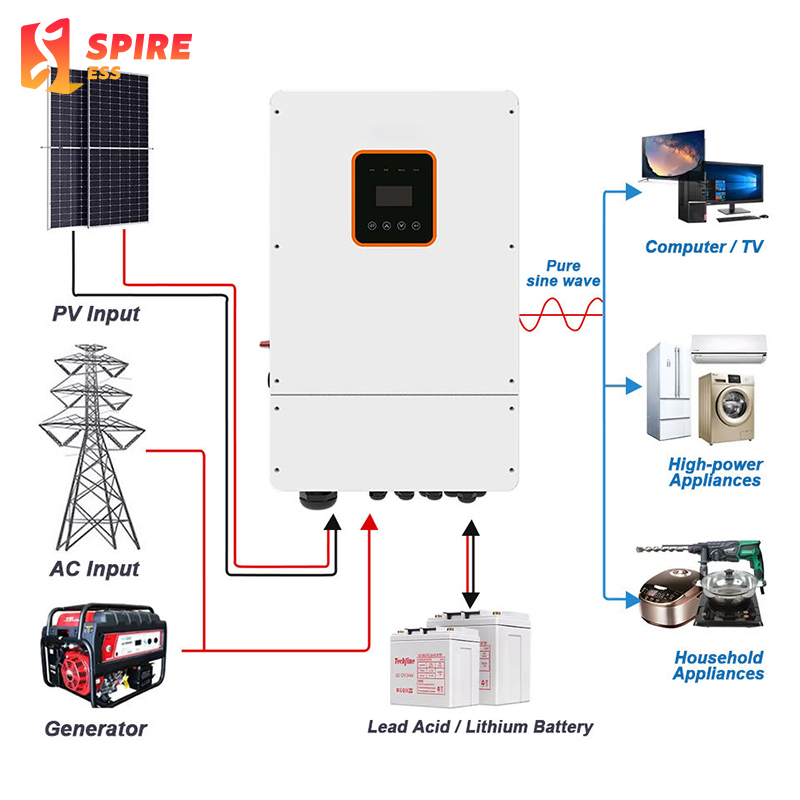Inverter Selection and Application Solutions for Energy Storage Systems
Our company offers a comprehensive solution for inverter selection and application in energy storage systems, covering off-grid inverters, hybrid inverters, and single-phase, dual-phase, and three-phase inverters. Below are detailed solutions based on different types of inverters and their characteristics:
I. Off-Grid Inverter Solutions
Application Scenarios:
– Homes and villages in remote areas without grid coverage or with unstable power supply.
– Outdoor adventures, camping, and temporary job sites requiring independent power supply.
Solutions:
– Equipment Selection: Choose high-efficiency, stable off-grid inverters that support a wide voltage input range to adapt to the voltage fluctuations of solar panels under varying sunlight conditions.
– System Design: Combine photovoltaic arrays, storage batteries, and controllers to form an off-grid power generation system. The inverter should have battery charge management functions to ensure batteries are charged and discharged within a reasonable range, extending their lifespan.
– Monitoring and Maintenance: Equip with an intelligent monitoring system to track the inverter’s operating status, battery levels, and system generation in real-time, allowing remote viewing and management via a mobile app or web platform.
II. Hybrid Inverter Solutions (Grid-Tied/Off-Grid Inverters)
Application Scenarios:
– Residential homes and small commercial buildings that require both grid connection and off-grid backup.
– Areas with unstable power supply, where continuous power is essential.
Solutions:
– Equipment Selection: Utilize advanced hybrid inverters that support automatic mode switching to ensure seamless transition to off-grid power during grid failures.
– System Design: Integrate photovoltaic arrays, storage batteries, grid connection interfaces, and controllers to create a hybrid power generation system. The inverter should have intelligent scheduling capabilities that automatically adjust operating modes based on grid status and household electricity demand.
– Grid and Off-Grid Strategies: Develop detailed strategies for switching between grid and off-grid modes to ensure rapid response during grid failures, safeguarding household power supply. Additionally, optimize grid generation strategies to enhance economic efficiency.
III. Inverter Type Selection (Single-Phase, Dual-Phase, Three-Phase)
Single-Phase Inverters:
– Application Scenarios: Primarily used in residential homes and small commercial shops with single-phase loads.
– Advantages: Simple structure and lower cost, suitable for small-scale power generation systems.
Dual-Phase Inverters:
– Application Scenarios: Less common, used in some European regions and specific power demand situations.
– Advantages: Provides higher current capacity but is relatively more expensive; selection should be based on actual needs.
Three-Phase Inverters:
– Application Scenarios: Ideal for industrial plants, large commercial buildings, and data centers requiring high power supply.
– Advantages: High power output, efficiency, and stability, suitable for large-scale power generation and supply systems.
Solutions:
– Choose the appropriate inverter type based on actual load requirements and power environment. Single-phase inverters are sufficient for residential and small commercial buildings, while three-phase inverters are necessary for industrial facilities to ensure stable and efficient power supply.
Summary
Our company’s energy storage system solutions encompass off-grid, hybrid, and various types of inverter selections, aiming to provide customized, efficient, and stable energy solutions for users. By integrating key devices such as photovoltaic arrays, storage batteries, controllers, and inverters, we can construct power generation and supply systems that meet diverse scenario needs, ensuring reliable and economical electricity supply for users in different environments.

